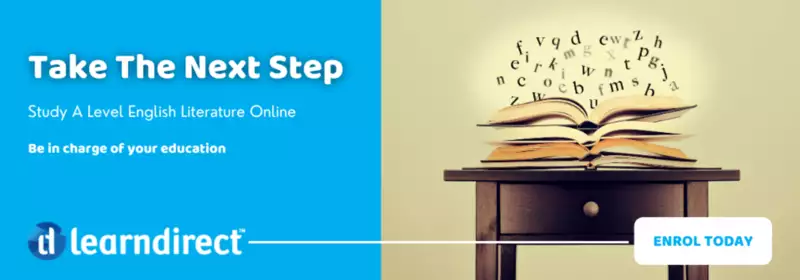A-Level English Literature is the gateway to culture both past and present. It brings history to life and enriches us with an insight into experiences that could be drowned out by the broader context of events.
Through studying literary classics, poetry and modern works, you will understand the evolution of both language and society.
You will gain an appreciation of what motivated some of the most influential writers in the English speaking world to write with such artistic merit. The works of Shakespeare, Hardy, Austen and Orwell, remain relevant and challenge our understanding of society to this day.
Through these works we gain insight into the challenges, fears and aspirations of the era, helping us to understand our modern-day society and how they inspire modern fiction.
A Level English Literature teaches you to analyse different types of writing and to write clearly in a range of styles. It also pushes you to read outside your comfort zone, while expanding your language skills and range of vocabulary.
Typically, literature would refer to texts such as plays, novels, non-fiction and poetry. Though in modern society, other mediums of communications such as screenplays and blogs could also be considered literature.
Through A Level English Literature, you are encouraged to explore the deeper meanings behind the written form.

Course Summary
This online A-Level has been devised to provide a relevant, engaging and up-to-date specification, that can provide a bridge to higher education. It challenges you to look at literature in the context of the time and place it was produced to provide an unbiased analysis.
You’ll study a wide range of texts in a shared context. Helping you to recognise how even the most dissimilar can carry the same principles of writing. While broadening your experience and appreciation of literary variety along the way.
By examining the writings of Shakespeare, World War I, literature from pre-1900 as well as modern texts, you will be able to analyse and compare poetry, prose and drama.
Through a varied range of assessments, you will learn to read critically, investigate and evaluate while undertaking independent research.
Upon successful completion of your A Level English Literature, you may progress to study further at university level should you wish.
Modules Covered
Literary genres – Looking at how texts are connected through a mainstream literary genre: either Aspects of tragedy or Aspects of comedy.
You’ll be required to choose either Aspects of tragedy or Aspects of comedy and study three texts: a Shakespeare play, a second dramatical text and one further text. Besides the Shakespeare play, one of the other two texts must be written pre-1900.
You will complete a closed book paper, assessing their approaches to tragedy or comedy.
Texts and genres – In this module, texts are grouped because they contain elements of more modern genres. These are crime writing or political and social protest writing, which continue to change as they are so heavily influenced by culture.
Choosing either Elements of crime writing or Elements of political and social protest writing, you will again study three texts. A post-2000 prose, a poetry piece and one further text. One of these again needs to be written pre-1900.
You also can respond to an unseen passage in the exam. This can be from poetry, prose or drama, including literary non-fiction. This paper will be open book.
Theory and independence – Allowing for wider reading and independent study, in this module you’ll choose your own texts. This will help you gain an understanding of how the contemporary study of literature needs to be informed by the fact that different theoretical and critical methods can be applied to the subject.
For this assessment, you will write about two different texts. One poetry and one prose. Each linking to a different section of the AQA Critical anthology (narrative theory, feminist theory, Marxist theory, eco-critical theory, post-colonial theory or literary value and the canon).

What You’ll Learn
The skills and abilities required to complete your A-Level English Literature are undeniably valuable in the workplace. So, choosing to study this subject can open a lot of doors for you.
By the time you have completed the course, you will be able to consume and understand large amounts of texts, analyse their meaning and produce independent insights and conclusions.
These skills are highly sought after in a range of roles and industries.
Approaching texts from a multitude of angles to comprehend how others can interpret them differently is a hard skill to learn. This demonstrates your ability to understand alternate points of view. Which can be advantageous in situations of mediation or negotiation.
As most of your time is spent deciphering the English language, your written and spoken communications will be exceptional. Having an extensive vocabulary, a good understanding of grammar and spelling coupled with writing clear and concise copy, will not go unnoticed in future job applications.
Reading and analysing text will become second nature. Pushing you to explore your creative mind to approach things differently. Validating your adeptness at creative problem-solving. This will help you to create carefully crafted and substantiated arguments.

What Next?
Many people with English Literature qualifications go onto to further literary studies. Such as creative writing, Victorian, fantasy or mediaeval literature. Some opt for more vocational courses like teaching, journalism or law.
There are many career opportunities available to you, in a wide array of industries. Previous graduates have gone onto to work in roles such as:
- Bid writer
- Broadcast journalist
- Copy editor
- Copywriter
- Editorial assistant
- English teacher
- Human resources manager
- Librarian
- Marketing executive
- Newspaper journalist
- Public relations officer
- Publishing assistant
- Social media manager
- Solicitor
- Speech and Language Therapist
- Web content manager
- Writer

Why Study Online?
Deciding to learn at home through a distance learning provider is a flexible and less intimidating way to get back into education.
Chances are you already have things taking up your time. Studying at home means you can do so without interrupting your current lifestyle. Balance your commitments and study at a time and pace that suits.
Because our course materials are presented in a variety of formats, you’ll find the learning experience more engaging and rewarding than a conventional course.
We have several payment options available to help you spread the cost. And with the ability to start the day you enrol, you can achieve your learning goals in no time.
A dedicated tutor is assigned to you throughout your studies. With the ability to contact them and access to your course materials all housed within our online portal.
Take the next step in your education and enrol on our A-Level English Literature course today.
learndirect is a leading UK distance learning institution. We provide the tools to learn and you do the rest. Find out more about our A Level English Literature course by clicking the link to the specification below.



















